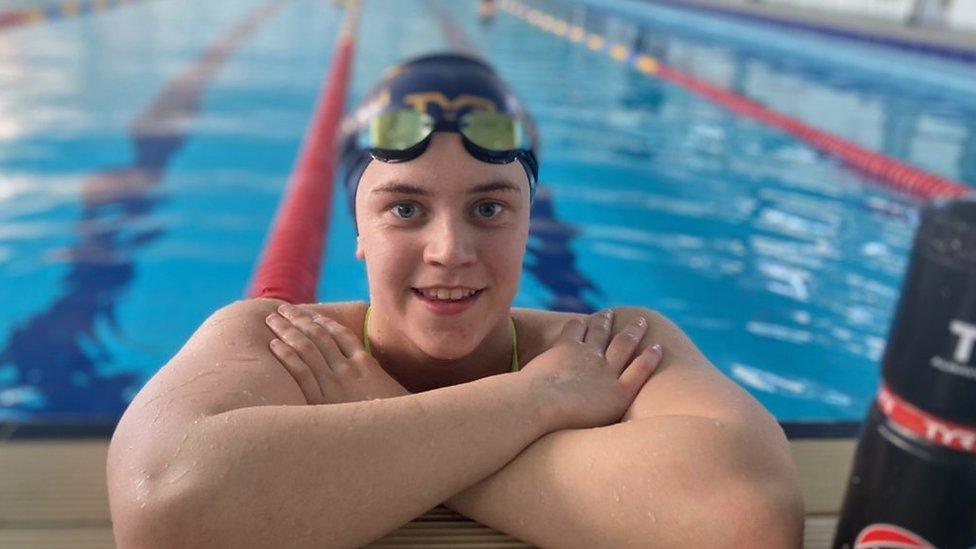Swimmer's bid to get more black and Asian children involved
- Published
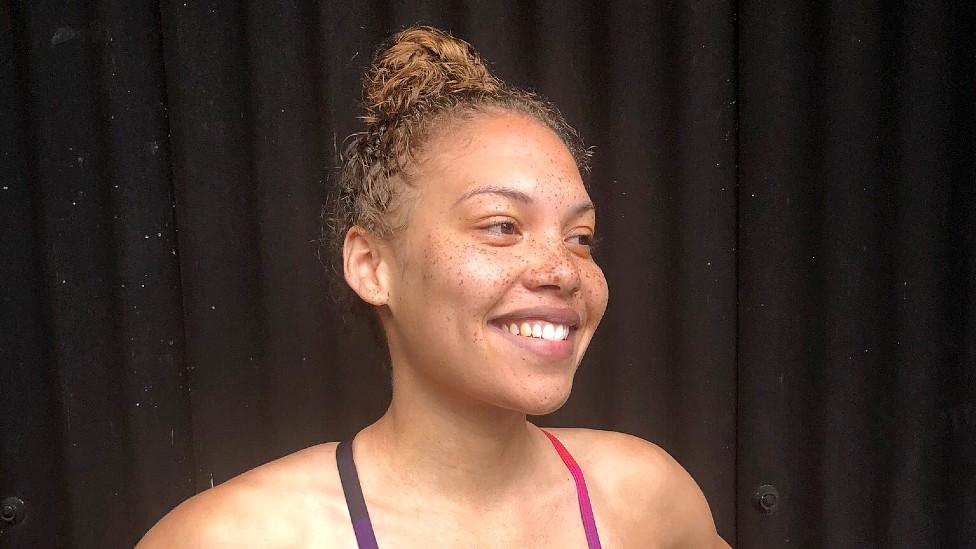
Seren Jones said swimming did not come naturally to her and she initially preferred other sports
"I remember being petrified of the water. I just hated it."
This is not the first memory of swimming you expect to hear from someone who spent 13 years pursuing the activity to elite level and winning a scholarship to an American university.
But talking to swimming equality advocate Seren Jones it's clear that she is not one to back away from a challenge.
Statistics from England and Wales both show people from black and Asian backgrounds are less likely to swim than those from white communities, with a lack of parental involvement leading to some children not having the right skills in the water.
This wasn't the case for Seren, 27, who was taken swimming by her parents from a young age.
Despite this early exposure to water, the pool was not somewhere she felt comfortable.
"I'd go with my sister, who's a year older than me, and I remember her going off and having a great time, and I remember just screaming and clinging on to my dad," she said.
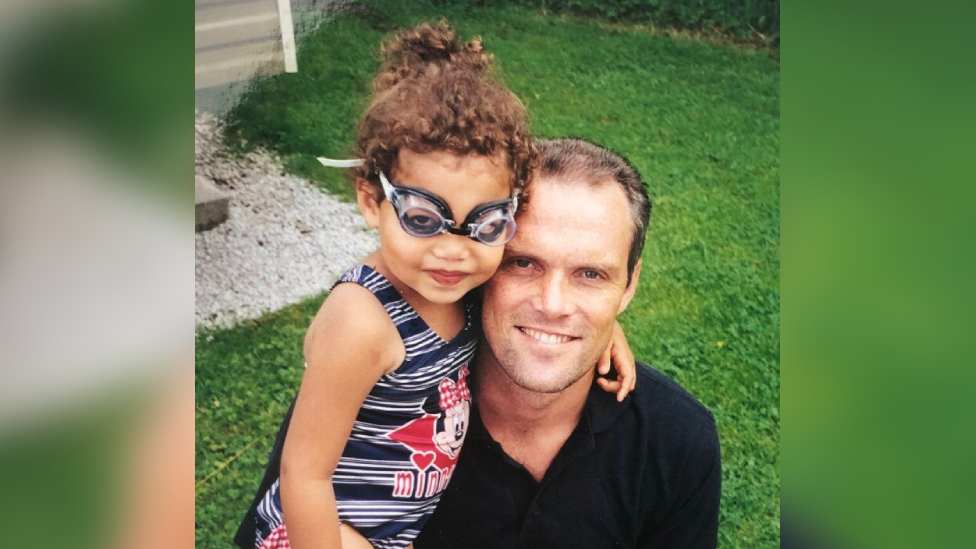
Seren as a toddler with her father Robyn, a former semi-professional footballer
"Swimming was never something that came naturally to me. I hated coming out of the pool and being cold and wet.
"And I didn't take to it the way I took to other sports - cross-country, gymnastics, netball, all of those came really naturally to me but swimming was the one I really didn't want to do and didn't enjoy."
So what made her persist?
"I think it frustrated me that I was bad at swimming, that it was a weakness. I just decided I wanted to keep working at it."
Seren and her sister were signed up for swimming classes, like many children, just to ensure they were safe around water and to be able to enjoy swimming on holidays.
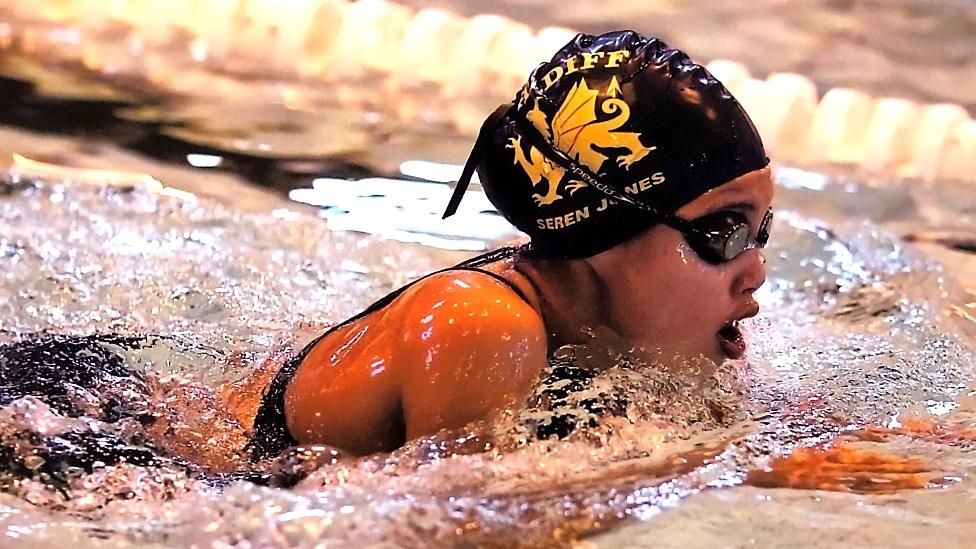
Seren was a member of City of Cardiff Swiming Club as a teenager
After some sessions at a leisure centre, they were told about the City of Cardiff Swimming Club, where there was an opportunity to train and compete, so both sisters went along for trials.
She remembers the moment that changed her attitude to swimming after joining.
"It was four of us girls in a lane. The three girls were really, really shy and it was our first session. The coach was like, 'the warm-up is 100m, so swim the lengths'.
"I was the brave one so I went first and by the time I had swum the 100m, I'd gone from leading the lane to the back. The girls had just completely swam over me.
"It annoyed me. I just wanted to get better at it and I just kept training. I didn't enjoy it for a long time. I remember my coach calling me out of the pool to do press-ups because I wasn't listening when I was meant to."
Over time "something just clicked," she started competing and - finally - enjoying herself.
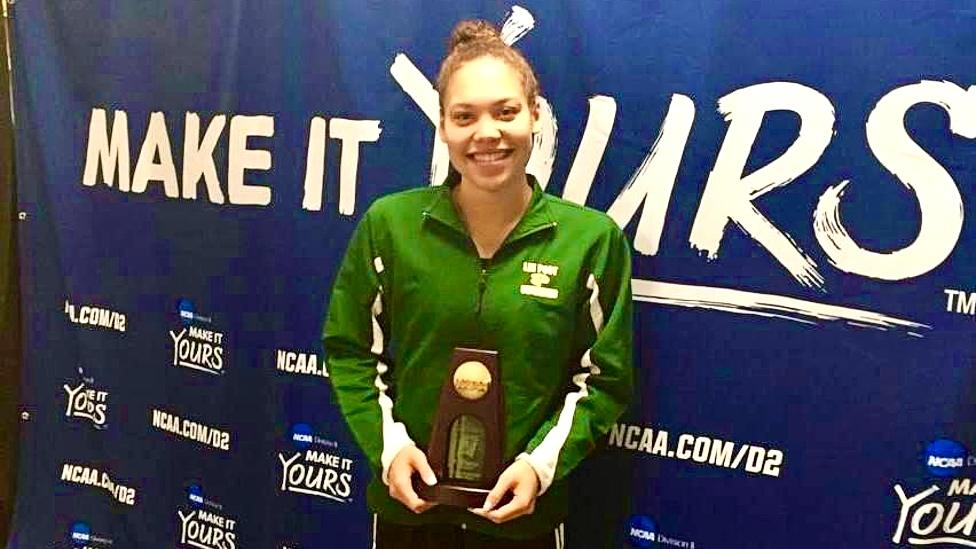
Seren had success at the National Collegiate Athletic Association championships
She was not overly conscious being one of only a handful of non-white swimmers in the sport. Going to a Welsh-medium school, she was used to being in a mostly white environment.
"I don't think I really digested it and understood it. I was happy and I had friends and that was fine.
"But definitely as I got older, going to Welsh nationals and only having a few of us there, it would be a luxury going to British nationals and Sheffield because they had the English clubs and they had more black swimmers.
"It would be like, 'oh my God, there are more of us'. There weren't a lot but at least there were more and that was always really refreshing and lovely for me."
By this stage, Seren was competing alone after her sister stopped swimming at the age of 16.
Time to study for university and to do other things were part of that decision but one factor was the impact of the water on hair and hairstyles.
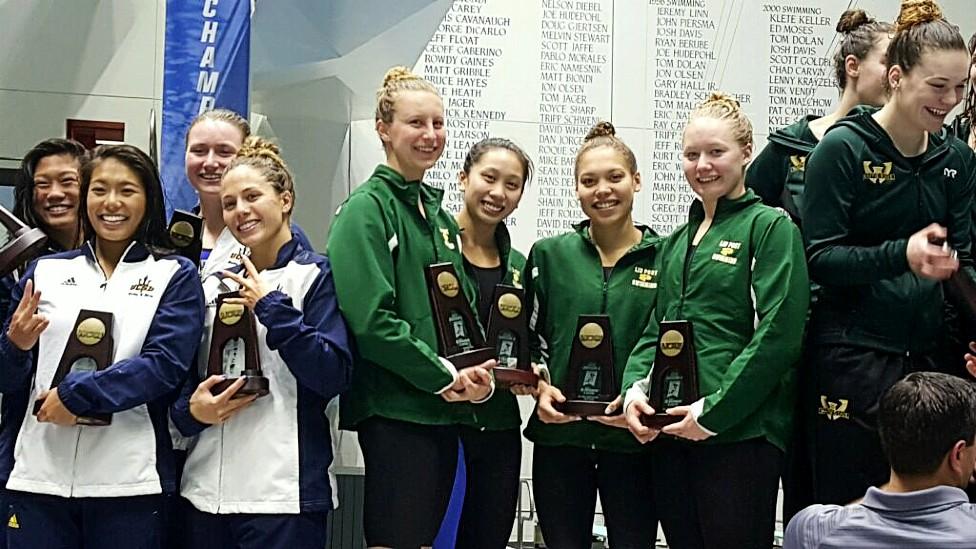
Seren and US college swim teammates winning trophies
"She said she wanted to have good hair, which at the time for us essentially meant straight hair," she explained.
"My sister's got quite dense Afro hair and she couldn't wear the styles that she wanted to wear, the styles that made her feel confident as a young woman growing up in a white-dominated society.
"Swimming didn't allow her to chemically straighten her hair or have long braids, which is what she wanted as well, and looks became important to her, especially when she was thinking about going into law, and [had ideas about] what a lawyer looked like."
Despite the long hours of training, Seren realised by the age of 15 that her ambition to become an Olympic swimmer was not going to happen, but luckily for her, she knew there was another route to continue her swimming career.
Learning from her father's experience of getting an athletic scholarship to study in the US on the back of his footballing ability (he later became a semi-professional in the UK), she applied for a swimming scholarship and in 2012 went to study English and journalism at Long Island University in New York.
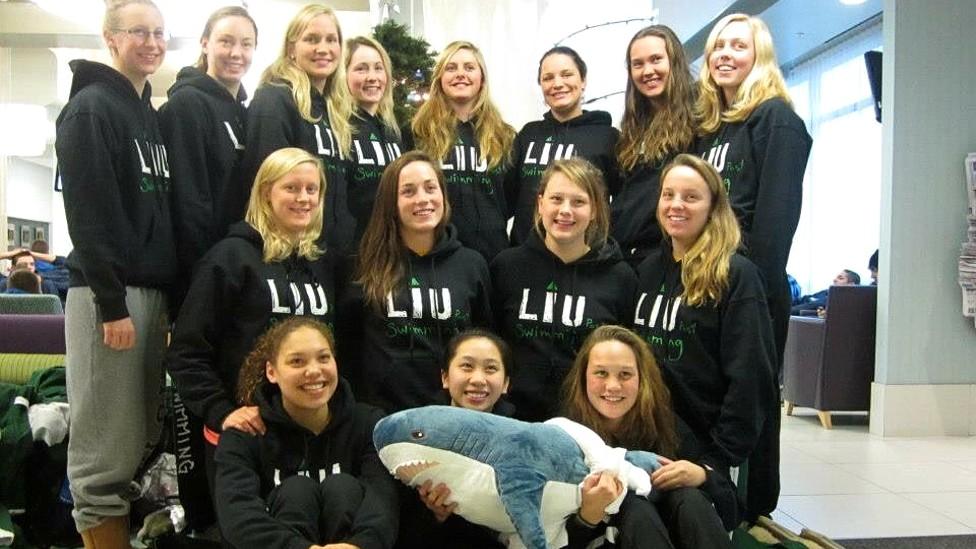
Seren (bottom left) found swimming in the US to be much more of a team effort
It gave her access to America's collegiate system where she "fell in love with swimming again" and enabled her to compete at elite level where she also - wrongly - imagined black representation would be less of an issue.
"When I got my offer to go to America, I was convinced I would meet more black swimmers. I was like, 'surely, it's America, I'm moving to New York'.
"I met hundreds of black athletes, but when it came to swimming it was the same thing all over again.
"I remember at the national collegiate level, meeting another black girl who swam for a university in Minnesota and we just clicked immediately, and there were a few black guys but they weren't the same calibre as us and were at the lower-ranking meets.
"We know that black athletes are so dominant in dry land sports, we literally see them on the podiums when it comes to track and basketball and football especially.
"But we didn't see that same translation into water sports, so America didn't quite live up to the hopes that I'd had for black swimmers."
On a more positive note, she does feel that there has been a shift in participation at the higher levels, with more black swimmers, referees and coaches at recent events she has attended.
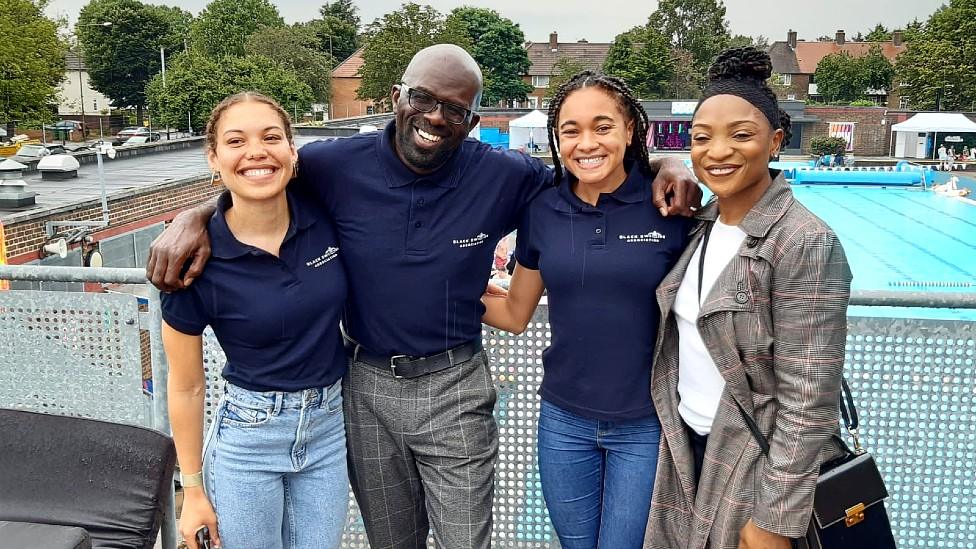
Seren Jones, Ed Accura, Alice Dearing and Danielle Obe set up the Black Swimming Association
Now Seren, an audio producer from Cardiff, has just announced a partnership between Sport Wales, external and the Black Swimming Association, external (BSA), the non-profit organisation she helped found to promote equality and accessibility in swimming for black and ethnic minority people.
She set up BSA alongside Team GB's only current (and second ever) black swimmer Alice Dearing, filmmaker Ed Accura and inventor Danielle Obe, who has designed swimming headwear for black people.
The non-profit has been working with Sport England on programmes to draw in people of Afro-Caribbean, African and Asian heritage.
"Swimming is not prioritised for a lot of kids who come from those backgrounds or communities," said Seren.
"You can break it down by thinking about the financial reasons. In Western societies, people of colour tend to represent those who live in lower socio-economic areas of the countries.
"Swimming is a super expensive sport. Not just to go to learn how to swim but it gets more expensive as you progress, unlike football, where you reap the rewards as you go through academies and services are provided for you usually [like] digs and kit and all those opportunities."
Swimming is the opposite, she says, with payment per race not just per competition - she remembers a charge of £7 per race, and that was at least 10 years ago - meaning each meet can add up to a lot of money if a coach asks a swimmer to enter multiple races.
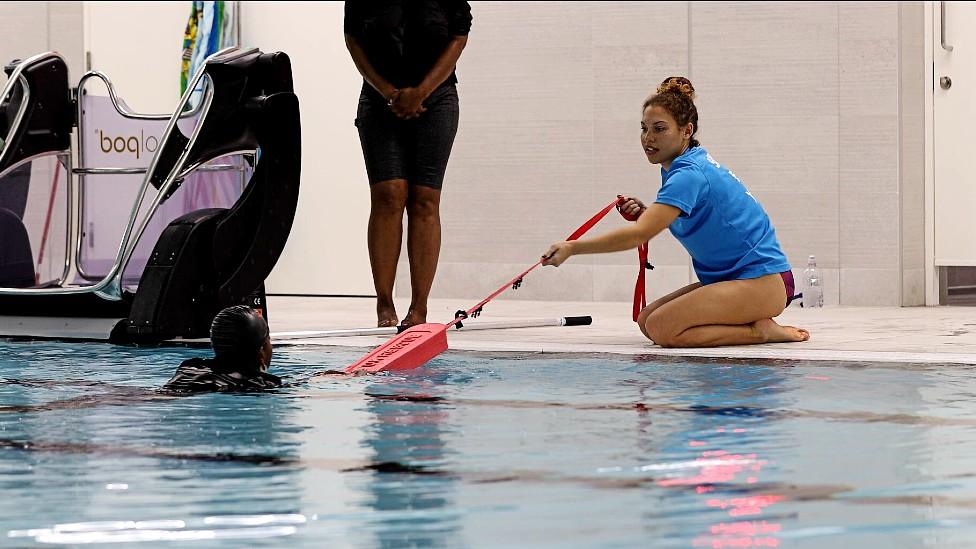
Giving people water confidence is central to the BSA's aim
For a family on a tight budget, when you factor in having siblings, transport, hotels if they are very far away, kit - which gets increasingly expensive - it can be prohibitive, she argued.
"The actual racing suits can cost around £300 and you need more than one, so it really does add up the more you progress."
She also said representation was "hugely influential", for example, seeing high-profile black footballers or Asian cricketers made it more likely children would get "funnelled" into those sports.
"But swimming is a sport where you don't see representation, so a lot of children and parents are going to think that it's a space that is not created or designed for them. It's kind of like a chicken and egg vicious cycle."
She also cited religious and cultural factors, such as privacy and modesty for some Muslims, particularly women, as a potential barrier when "you're required to be physically vulnerable - so much of your body is on show all the time".
Seren now understands her mother's talks to her and her sister about how they were role models for younger black children when they were competing as teenagers.
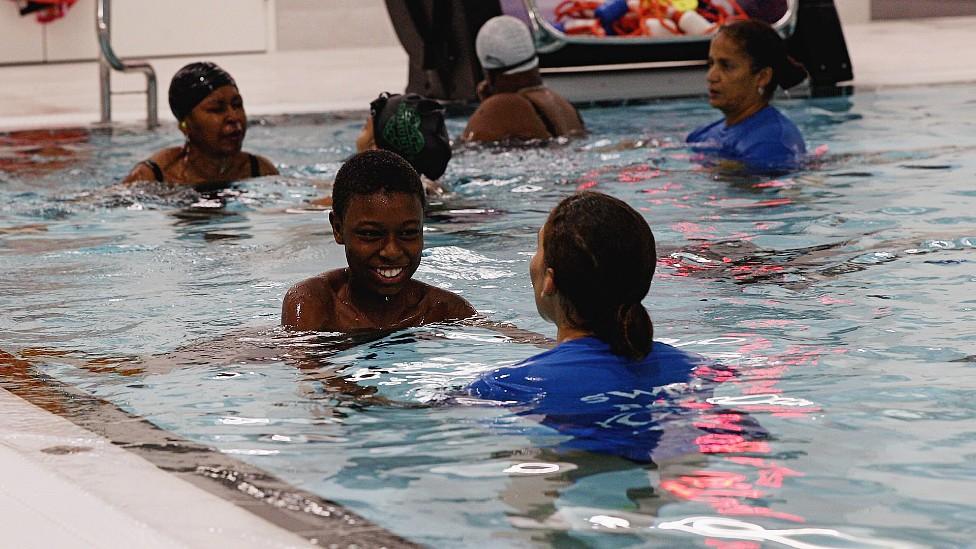
Participants at one of the first BSA sessions held in Hackney, London
The BSA's move into Wales will see the creation of a programme delivery officer based in Cardiff alongside Sport Wales' headquarters.
They will aim to bring in the next generation of black swimmers as well as increase non-white representation in the aquatic workforce by 25%.
Only 3% of the UK's swimming workforce is non-white.
Brian Davies, Sport Wales' acting CEO, said: "In order to make sport more welcoming, inclusive, and diverse in Wales, we want to broaden our networks so that we are working with more experts who have a better understanding of the communities that we're seeking to engage with.
"We're very interested in the BSA's research into the participation barriers which diverse communities face, as well as their plans for increasing the representation of Black and Asian people in the aquatic workforce."
While Seren now swims recreationally as much for the mental health benefits as the physical, she is fully aware of what she gained from persisting with a sport she initially disliked so much.
"I never would have thought it would have taken me around the world to train or taken me to America for my degree," she said.
"I never would have thought I'd set up something like the BSA so it's been an incredible experience, how much the sport has given me."
Related topics
- Attribution
- Published2 March 2020
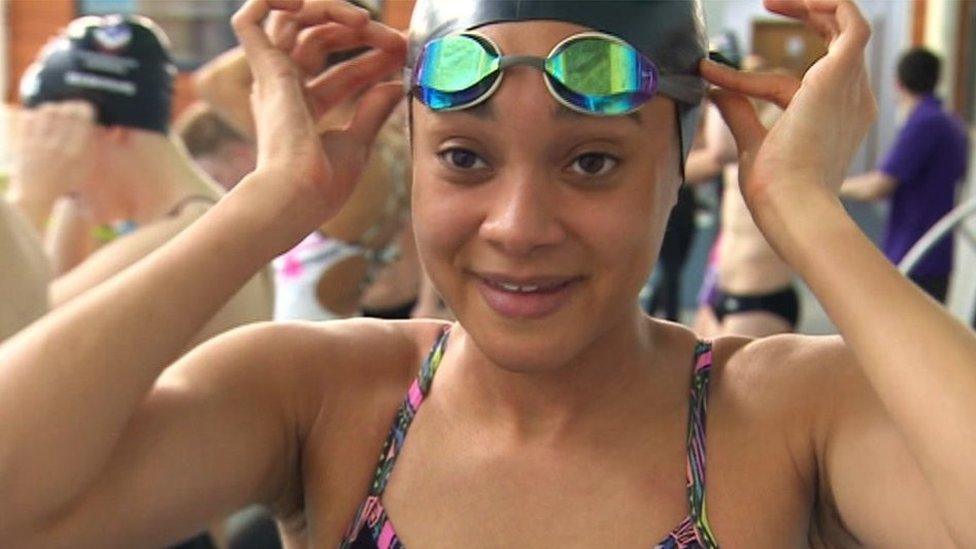
- Published4 August 2021
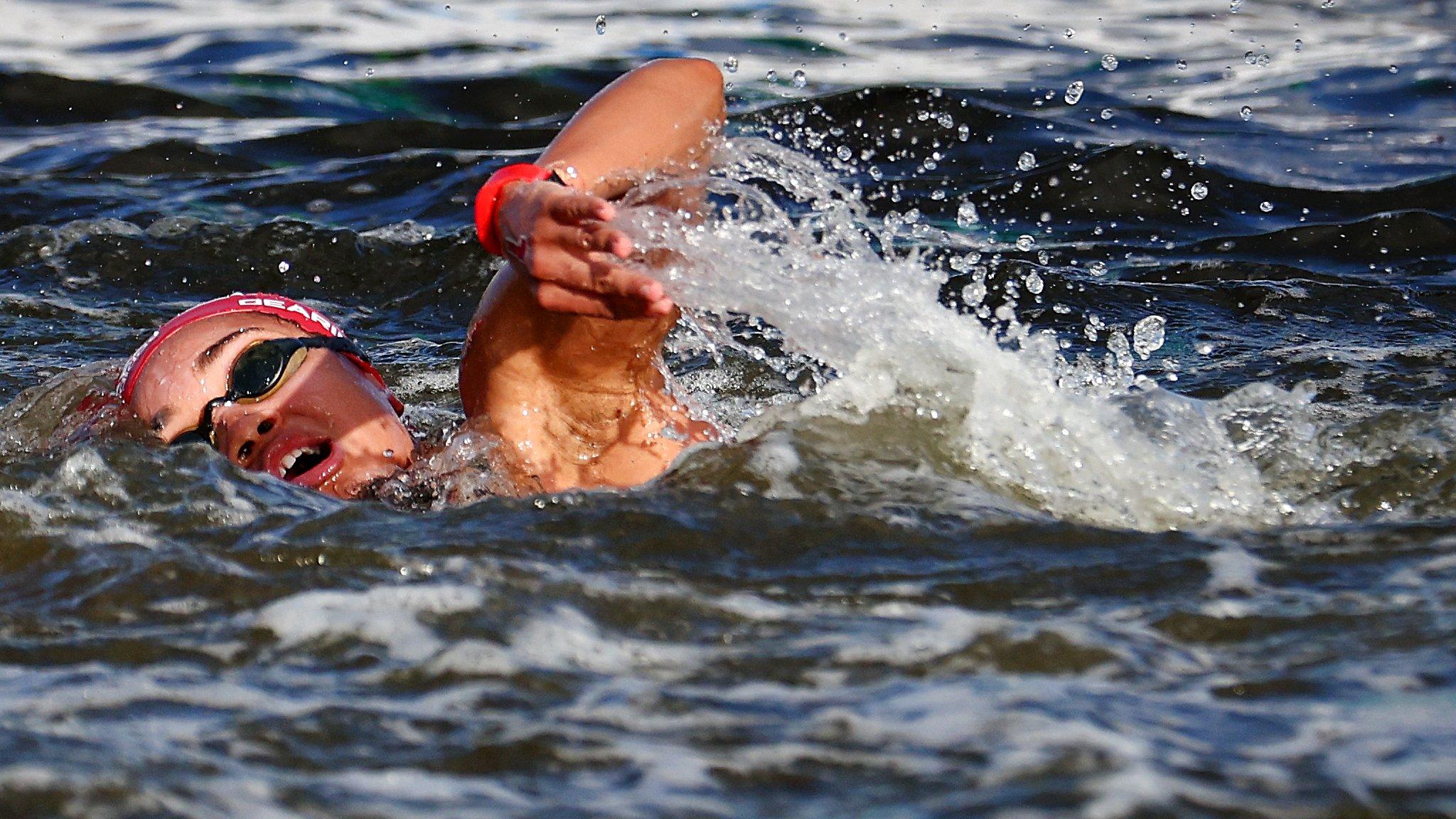
- Published17 September 2021
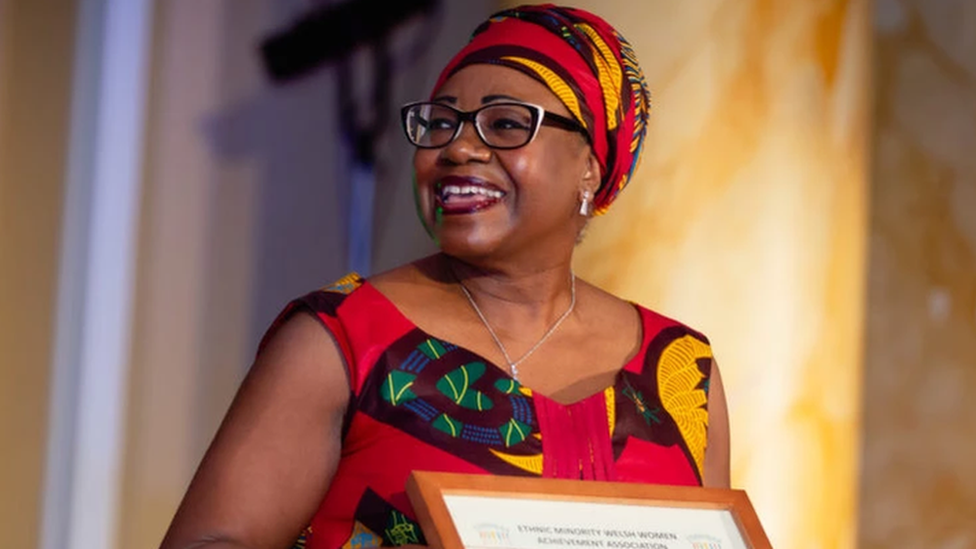
- Published17 October 2021
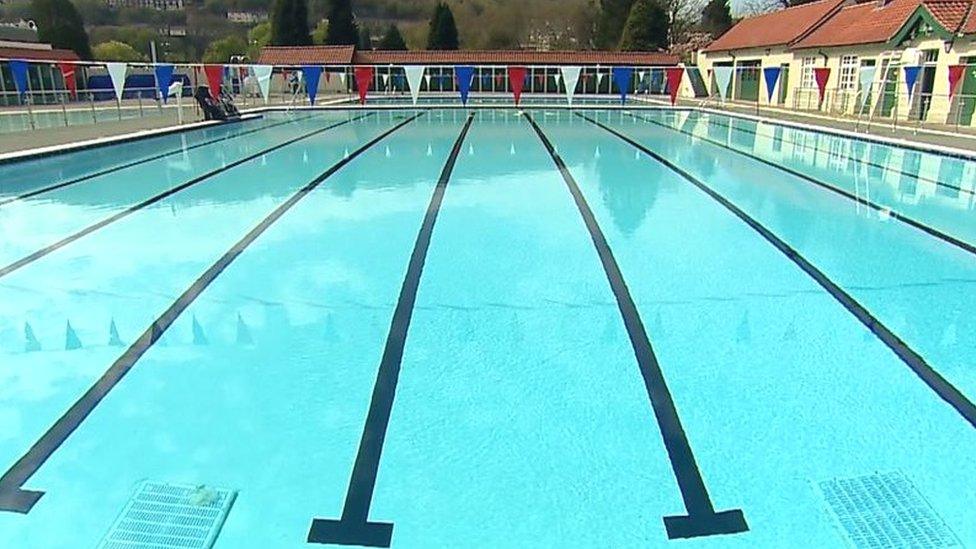
- Published25 January 2022
- Published3 December 2019
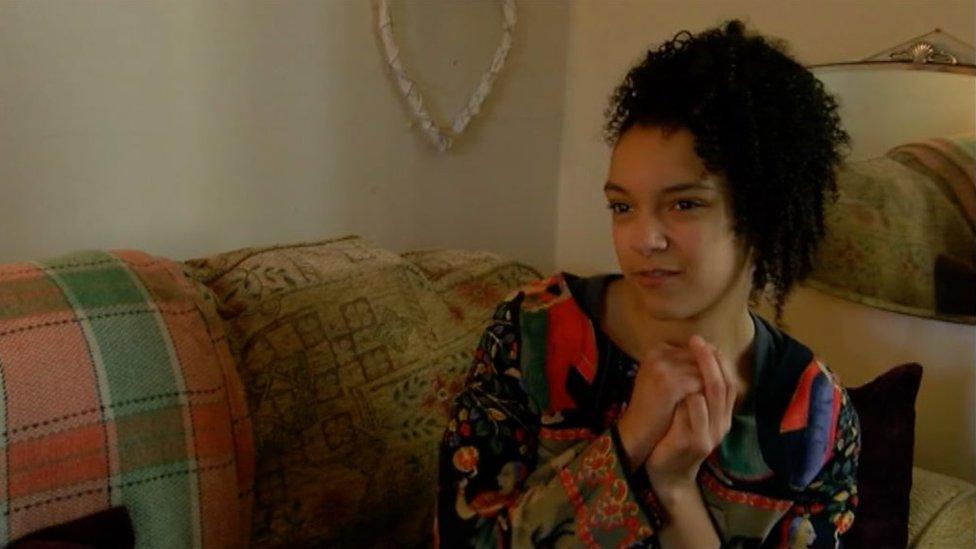
- Published25 May 2021
